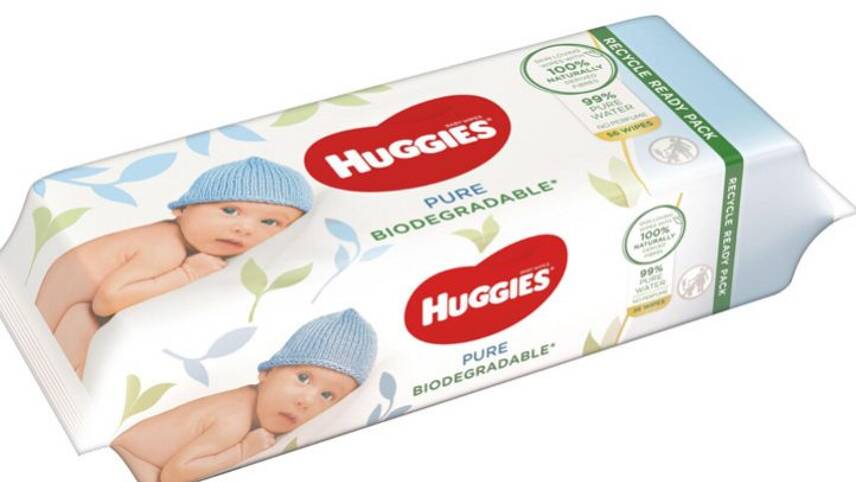Register for free and continue reading
Join our growing army of changemakers and get unlimited access to our premium content

Image: Huggies
Research conducted for the BBC’s War on Plastic series last year found that 11 billion wet wipes are sold in the UK every year, 90% of which contain some form of plastic. The presenters of the show put pressure on Kimberly Clark, P&G and Johnson & Johnson to disclose how much plastic they use in their wipes and how they plan to reduce or remove it, prompting similar pressure from consumers.
In October 2019, Huggies announced a commitment to eliminate plastics from its baby wipe range in the UK over the next five years, covering the wipes themselves and their packaging.
The launch of the new wipes, called Huggies Pure Biodegradable, is a step towards this goal. The product is made using 100% “natural fibres” and consumers will be encouraged to place used wipes in their regular household waste, as degradation outside of landfill conditions will not be as effective.
“We know this announcement will be welcome news for parents who rely on these wipes as an everyday childcare essential but are also trying to reduce their impact on the planet,” Kimberly-Clark UK & Ireland’s VP and managing director Ori Ben Shai said.
“Launching our first biodegradable product brings us ever closer to fulfilling the goals made in our ‘Tiniest Footprint’ Mission. We know we still have a long way to go on this ambitious plan but are committed to developing the best possible products that meet our consumers’ ever-changing demands.”
Kimberly-Clark estimates that it has removed 359 tonnes of plastic from its broader portfolio of baby wipes and wipe packaging this year. Aside from creating plastic-free wipes, it has removed the internal bags from large pack boxes. Huggies is notably part of WRAP’s UK’s Plastic Pact.
Something sweet
In related news, Mars Wrigley UK has unveiled redesigned packaging for some of its most popular confectionery brands which it claims will mitigate the use of 51 tonnes of plastic per year.
The lighter weight designs will be used to house products including sharing bags of M&Ms, Galaxy Counters, Skittles and Malteasers. On average, they contain 10% less plastic than the current range of packaging. They will be launched in supermarkets from April 2021.
“As well as cutting back our plastic use, it means for some brands we can fit more packs into the boxes we ship, increasing our efficiency and taking the equivalent of 90 lorry loads of boxes off the road each year,” Mars Wrigley UK’s sales director and interim general manager Nick Reade said.
Mars’ ‘Sustainable in a Generation’ sustainability strategy includes commitments to reduce virgin plastic use by 25% by 2025 and to ensure that all packaging is recyclable, reusable or compostable within the same timeframe.
Sarah George


Please login or Register to leave a comment.